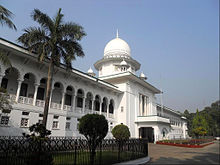
The first summit of
SAARC held at the Parliament in Dhaka in 1985. Bangladesh played a pioneering role in the formation of the South Asian community

Map showing countries where Bangladesh has participated in
UN peacekeeping operations
During the
Gulf War in 1991, Bangladesh contributed 2,300 troops to the US-led multinational coalition for the
liberation of Kuwait. It has since become the world's largest contributor of
UN peacekeeping forces, providing 113,000 personnel to 54 UN missions in the Middle East, the Balkans, Africa and the Caribbean, as of 2014.
[170] Bangladeshi aid agencies work in many developing countries worldwide. An example are the operations of
BRAC in Afghanistan, which benefit 12 million people in that country.
[171]
Bangladesh's most important bilateral relations are with the two regional powers
India and China. The
relationship with India is bound by shared ideals of democracy, cultural heritage and the
1971 Liberation War, in which
Indian military and diplomatic support was crucial in defeating Pakistani forces on Bangladeshi territory. In the early years of Bangladesh's independence, Dhaka and Delhi enjoyed a strong alliance. However, when
military coups began in Bangladesh during the late 1970s, there was increasing distance between the two neighbors. Differences emerged over
sharing the water of the Ganges. Bangladesh developed
very warm relations with the People's Republic of China in the 1980s. Defense cooperation rapidly increased as the Bangladeshi military became one of the largest buyers of Chinese defense equipment, given their relative cost-effective attractiveness for the Bangladeshi defence budget.
[172] China has supplied Bangladesh with
missiles and
frigates. China is also one of Bangladesh's largest trade partners. In more recent years, India has sought to revive relations with Bangladesh through a strategic partnership focused on counter-terrorism, aid for infrastructure development and promoting regional economic integration. Bangladesh and India are the largest trading partners among SAARC nations. The Indian and Bangladeshi armed forces maintain robust strategic engagement.
Relations with Pakistan have been affected by issues related to the
1971 genocide and terrorism. Bangladesh enjoys strong ties with regional neighbors
Nepal,
Bhutan,
Sri Lanka and the
Maldives.
Bangladesh's relations with neighboring
Myanmar are relatively warm. Myanmar was one of the first countries to recognize Bangladesh's independence. Relations were in a brief deadlock due to a naval standoff in 2008 over disputed maritime territory.
[173] In 2012, the two countries resolved their maritime boundary disputes at the
International Tribunal for the Law of the Sea.
[174] The relationship with Myanmar is complicated by the persecution of the
Rohingya people in
Rakhine State. As of 2016, Bangladesh hosts between 300,000 and 500,000 Rohingya
refugees who have fled Myanmarese military crackdowns since 1978.
[175] In 2012, Bangladesh denied entry to further refugees after another spate of sectarian riots broke out in Rakhine State.
[176] Both countries view each other as gateways to South and Southeast Asia. Their armed forces maintain regular dialogue and both depend on Chinese military supplies.
Thailand is an important ally and economic partner of Bangladesh, with the two countries sharing strategic interests in the Bay of Bengal region.
The United States enjoys a warm and strategic partnership with Bangladesh. 76% of
Bangladeshis viewed the United States favorably in 2014.
[177] The United States is Bangladesh's largest foreign investor and trade partner. Bangladesh is the third largest recipient of American development assistance in Asia after Afghanistan and Pakistan.
[178] Relations with the United Kingdom are long-standing. Bangladesh is one of the largest recipients of U.K. development aid. Japan and Bangladesh have strong relations with common strategic and political goals.
[158] Japan has been Bangladesh's largest development partner since independence, providing over US$11 billion in aid.
[179] Relations with the
Russian Federation have focused on trade,
nuclear energy and defense supplies. There are also growing trade links with Latin American nations, particularly
Brazil and
Mexico.











